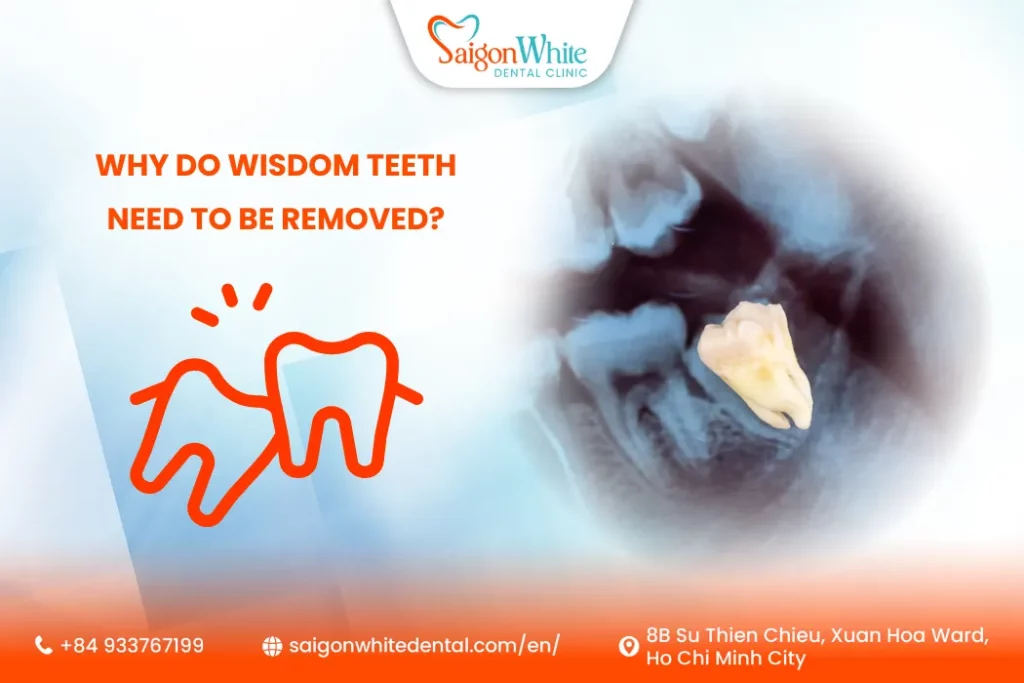Wisdom teeth — also known as third molars — are the last set of teeth to develop, usually appearing between the ages of 17 and 25. While some people experience no issues when their wisdom teeth erupt, many others face complications that require removal. Wisdom tooth extraction is one of the most common oral surgery procedures worldwide.

So why do these teeth often need to be removed? This article will explain the reasons, risks of keeping them in, and what the removal process typically involves.
Whether you’re experiencing symptoms or just curious, understanding wisdom teeth can help you make informed decisions about your oral health.
What Are Wisdom Teeth?
Wisdom teeth are your third set of molars and are located at the very back of your mouth — one in each corner of the upper and lower jaws. These teeth were useful to our ancestors, who consumed a coarse diet of raw plants and tough meats that caused significant tooth wear and loss. In those times, wisdom teeth would emerge to replace lost teeth.
However, in today’s world, with softer diets and improved dental care, most people retain their permanent teeth well into adulthood. As a result, there’s often not enough space in the mouth for wisdom teeth to grow in properly, which can lead to problems.
Most people have four wisdom teeth, but it’s not unusual to have fewer or even none. Some may erupt normally, but many grow at odd angles, become trapped (impacted), or cause complications.
Common Reasons Wisdom Teeth Need to Be Removed
Wisdom teeth aren’t automatically bad, but due to the limited space in the jaw and their unpredictable growth, they can cause several issues. Below are the most common reasons dentists recommend removal:
Impaction
An impacted wisdom tooth fails to emerge fully through the gum. It may be partially or completely trapped in the jawbone or soft tissue. This can lead to pain, swelling, and even cyst formation.
Crowding
Since wisdom teeth are the last to erupt, there’s usually no room for them. They can push against neighboring teeth, causing crowding and shifting—especially problematic for people who’ve had braces.
Infection and Gum Disease
Partially erupted wisdom teeth create a flap of gum tissue where bacteria can thrive, leading to infections like pericoronitis (inflammation of the gum surrounding a tooth). This is painful and can spread quickly if left untreated.
Tooth Decay
Due to their position at the back of the mouth, wisdom teeth are harder to brush and floss. This makes them more prone to plaque buildup, decay, and cavities.
Cysts and Tumors
Though rare, impacted wisdom teeth can form fluid-filled cysts or even tumors. These can damage the jawbone and surrounding teeth if not addressed in time.
Chronic Pain
If you feel pain or pressure in your jaw or near your molars, your wisdom teeth could be the cause—even if they haven’t fully erupted.
Signs That Your Wisdom Teeth Should Be Removed
Even if your wisdom teeth haven’t caused noticeable problems yet, certain symptoms can be warning signs that they need evaluation or removal:
- Persistent pain or throbbing in the back of the mouth
- Swollen, red, or bleeding gums
- Jaw stiffness or difficulty opening your mouth
- Bad breath or unpleasant taste due to infection
- Headaches or earaches caused by pressure from impacted teeth.
- Shifting teeth or bite changes
Don’t wait for the pain to get worse. Early detection makes treatment smoother and recovery faster.
What Happens If Wisdom Teeth Are Not Removed?
Ignoring problematic wisdom teeth can lead to more serious oral health issues, including:
Jaw Damage
Impacted teeth can cause cysts or tumors, damaging nearby bone and nerves.
Damage to Adjacent Teeth
Wisdom teeth can push against second molars, leading to decay, resorption, or misalignment.
Chronic Infections
Recurring infections can weaken your immune system and require repeated antibiotic treatments.
Orthodontic Setbacks
If you’ve had braces or Invisalign, wisdom teeth can reverse your results by crowding teeth back out of alignment.
In short, wisdom teeth that are problematic now—or likely to become problematic—are better removed early.
The Wisdom Tooth Removal Procedure
At reputable clinics like Saigon White Dental, wisdom tooth extraction is a routine and safe procedure performed under local anesthesia, with sedation options available for comfort.
Step-by-Step Overview:
Consultation & X-ray
Your dentist will examine your mouth and take panoramic X-rays to see the exact position of your wisdom teeth.
Treatment Plan
Depending on the impaction level, your dentist may recommend simple extraction or surgical removal.
Anesthesia
You’ll be given local anesthesia, and if desired, sedation for relaxation.
Extraction
- Simple extraction if the tooth has erupted fully
- Surgical extraction if the tooth is impacted or under the bone
Stitching & Gauze
Stitches may be placed, and gauze will be used to control bleeding.
Recovery Instructions
You’ll receive aftercare guidelines, pain management advice, and follow-up recommendations.
Most procedures take less than 45 minutes.
Recovery After Wisdom Tooth Extraction
Recovery typically takes 3 to 7 days, depending on the complexity of the extraction and your body’s healing ability.
What to Expect:
- Swelling and mild discomfort for 1–3 days
- Bruising on cheeks (in some cases)
- Limited jaw movement temporarily
- Bleeding for a few hours post-surgery
Aftercare Tips:
- Use cold compresses and prescribed pain relievers
- Eat soft foods (yogurt, soup, mashed potatoes)
- Avoid straws, smoking, and vigorous rinsing for 48 hours
- Maintain gentle oral hygiene
- Follow up with your dentist if symptoms worsen
Watch for:
- Excessive bleeding after 24 hours
- Severe swelling or pus
- Fever or chills
- Dry socket (when the blood clot is lost from the extraction site)
With proper care and a skilled dentist, recovery is usually smooth and uneventful.
When Is the Best Time to Remove Wisdom Teeth?
Most dentists recommend removal between the ages of 17 and 25, before the roots are fully formed and complications arise.
Benefits of early removal:
- Faster healing
- Fewer complications
- Less risk of root damage or nerve injury
- Preventive care before pain starts
Delaying removal can lead to more complex surgery and longer recovery time. If your dentist sees signs of future issues on your X-ray, preventive extraction is often the safest route.
Who Should You See for Wisdom Tooth Removal?
Wisdom tooth removal is best performed by:
- General dentists (for simple cases)
- Oral surgeons (for complex or deeply impacted cases)
When choosing a clinic, look for:
- Experience with surgical extractions
- Modern diagnostic equipment (3D CT, digital X-ray)
- English-speaking staff, if you’re an expat or traveler
- Clean, sterile environment
- Good aftercare and follow-up services
Saigon White Dental, based in District 3, Ho Chi Minh City, offers gentle wisdom tooth extraction for both locals and international patients.
The clinic is equipped with modern technology, multilingual support, and affordable dentist pricing—making it a trusted destination for wisdom tooth care.
Conclusion
Wisdom teeth don’t always cause problems, but when they do, removal is often the best and safest option. Impacted, infected, or misaligned wisdom teeth can lead to pain, infections, and long-term damage to your oral health.
Early evaluation and timely removal—especially during young adulthood—can save you from future complications. If you’re experiencing symptoms or want peace of mind, consult with a professional dental team to assess your wisdom teeth today.
Need a Second Opinion or Ready for a Check-up?
At Saigon White Dental, we offer:
- Free consultations with 3D imaging
- Gentle wisdom tooth extractions
- Sedation options for a stress-free experience
- English-speaking dentists with years of experience
Address: Phường Xuân Hòa, HCMC
Website: saigonwhitedental.com/en/
Hotline / WhatsApp: +84933767199
Let us take care of your wisdom teeth—with comfort, clarity, and confidence.

 Book now
Book now